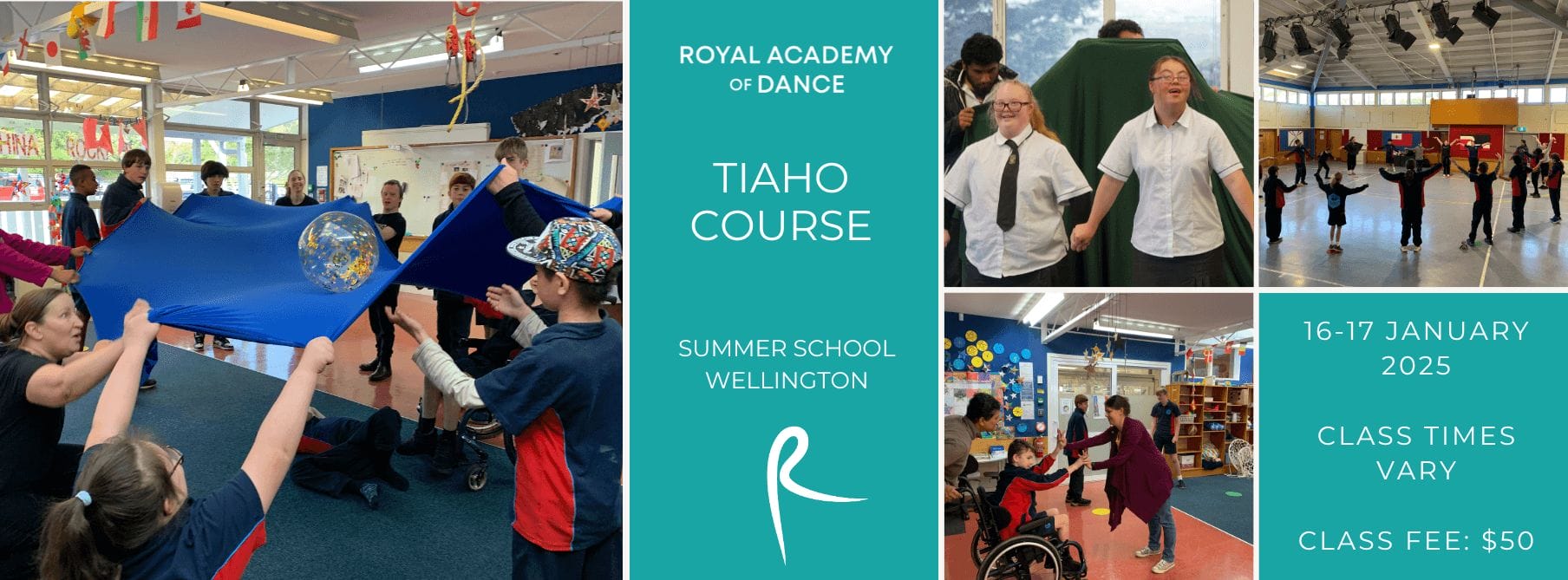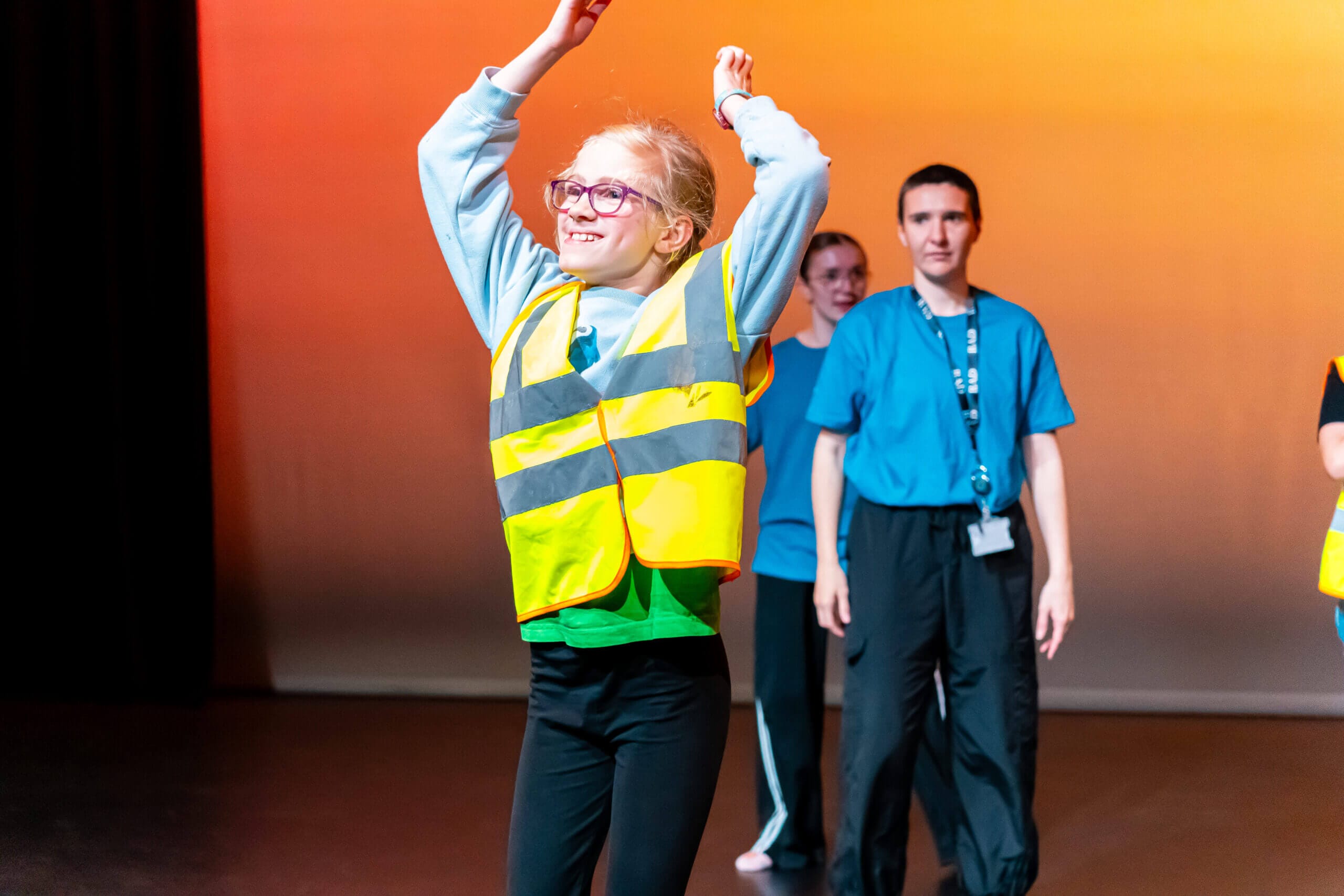Tīaho
Tīaho aims to provide an enjoyable and enriching creative and educational experience that contributes to the wellbeing of students with additional learning needs.
Tīaho (meaning to shine in Te Reo) is the New Zealand version of the Royal Academy of Dance RADiate programme. RADiate provides subsidised, inclusive dance classes with specialised dance tutors, to children with additional learning needs. The highly successful and sought-after project works with children and young people with a wide range of different abilities and takes place in both mainstream and Special Education settings in London.

Tīaho at Summer School
Workshops will be subsidised by the RAD NZ with a small contribution of $250 per 8-week programme from the participating school.
Background
In New Zealand, ballet is often seen as a choice for a relatively elite group of young people– people of a certain shape and size, and affordable for only those of a certain socioeconomic status. Many ballet classes are inaccessible for children and young people with differ-abilities. However, at the RAD, we firmly believe dance is for all and that movement is a fundamental part of our being.
The RAD has committed to the principles of the social impact of dance. It acknowledges and promotes the positive impact of movement and dance on a community and the mental, physical, social and spiritual benefits for an individual.
Partnerships
WIDance
WIDance is a collective organisation which provides community dance classes, workshops and performance opportunities in the Wellington region for people of all ages and abilities. From a seed planted by Touch Compass in 2007, WIDance aims to foster connections, opportunity and growth for all abilities through the power of dance by providing dance training and performance opportunities for people with and without disabilities. Their classes enable and encourage participants to reach their full potential, through developing skills in contemporary dance technique, improvisation, and composition.
Limelight Dance Academy
Limelight Dance Academy in Hamilton, New Zealand, offers a weekly class for children with additional learning needs called Dance for All. For several years RAD teacher, Hayleigh Rossetter, who trained with RADiate in London, has been providing workshops in a local school, working with students with additional learning needs. Limelight is the first RAD school in NZ to open its own weekly class for students with differ-abilities and has plans for more. Hayleigh will be working with Tīaho as trainer, tutor and lead for quality assurance.
The Programme
Tīaho will provide an eight-week programme of workshops.
Each programme will consist of eight, weekly, 2-hour sessions, delivered by experienced and trained tutors.
The 2-hour sessions might involve one, two or perhaps three separate groups of students depending on the age and ability of the students and how it fits with the school timetable.
The aim of the programme is to offer students with additional learning needs a valuable and engaging creative experience that is fun while building self-confidence and self-esteem. Through regular participation in a group, students will enjoy the magical experience of moving to music as well as an opportunity to enhance their self-discipline, coordination, spatial awareness and ability to cooperate with others.
Students taking part in the workshops may have a diagnosed learning disability or may have recognised but undiagnosed additional learning needs. The school may select students from several classes or may select a class, in which there are a number of students with differ-abilities. The project can work with a wide range of students and, rather than single out students with differ-abilities, all students in a class can participate and would benefit equally from the project.
Each school’s programme will be tailored and developed with input from the school, so that the programme responds to the individual needs of the students such as using class topics, their interests and aspects of NZ culture.
There will be an expectation that teacher aids and teachers, who would normally be teaching the students at that time, actively participate in each session. There will be preparatory information available to and communication with school staff so that participating teachers and teacher aids are prepared for and comfortable with their role and involvement.
Tutors will be experienced in teaching young people with differ-abilities and will have had specialised training for Tīaho with the RAD. They will also have undergone police vetting and had safeguarding training.
Schools will sign an agreement to ensure the expectations are clear.
There would be a small contribution charged to schools of $250. This has been kept low in order to make it affordable for students if they are required to contribute.


Subscribe to our mailing list
- Be the first to hear about our news and events
- Choose the type of news that interests you
- Get discounts from the RAD shop

